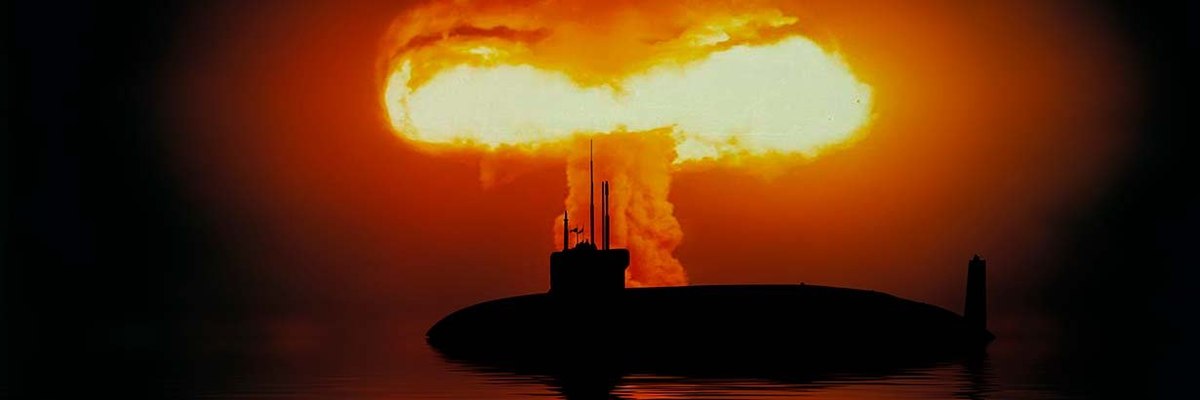For our latest data on public opinion on World War 3 see our article World War 3 likely in next 5-10 years, think most Britons
Forgive me if I adopt a slightly different approach to this week’s column. As you may know, I usually offer a proposition and invite your views on it. Are you for or against? But this week I want to discuss World War 3 and I reckon it’s reasonable to assume that on this of all issues we are unanimous. So, rather than ask whether you are for it or against it, I’d like to know whether you are becoming increasingly afraid that that is the direction in which the world is heading. And if so why and what should we do?
The Doomsday Clock is widely regarded as the most reliable indicator of what stage the world is at on this, the most perilous journey imaginable. It warns us how close mankind might be to a global nuclear catastrophe. The hands of the clock are adjusted every year by the members of the board of sponsors of the bulletin of the Atomic Scientists. The board includes ten Nobel laureates. They are among the world’s most knowledgeable, experienced and far-sighted scientists in their field. The ‘clock’ itself has gained huge respect around the world. It is recognised as the most reliable indicator of how vulnerable we are at a given point to global catastrophe caused by manmade technologies. In other words: nuclear Armageddon.
Last year the hands were moved forward to just ninety seconds before midnight. That’s the closest they have ever been. The widely accepted view among scientists is that if that sounds terrifying it’s because it is. Perhaps unthinkable is a more suitable word. But, they say, think it we must. Many politicians say the same. They worry that the global agreements that have limited the spread of nuclear weapons for the pat half century are breaking down.
In his first major speech as Britain’s new defence secretary, Grant Shapps made the chilling suggestion that we are 'moving from a post-war to a pre-war world'. The Third World War is coming, he said, and Britain is likely to be fighting a many-sided conflict against Russia, Iran, China and North Korea within five years.
Shapps reflected on what he called the dawn of a new era some fifty years ago: ‘Conflict didn’t disappear of course. But with no great power menacing the continent, peace gave the impression of being just around the corner.’ That era, he warned is over and ‘our adversaries are mobilising.’
Here’s how he describes this new era: ‘The belligerent autocratic state is making a comeback. Having got away with the illegal annexation of Crimea in 2014, Putin launched his brutal invasion of Ukraine eight years later. And as Russia continues its illegal campaign in Ukraine, China is assessing whether the West loses its patience. Today, Russia and China have been joined by new nuclear, and soon to be nuclear, powers. North Korea promising to expand its own nuclear arsenal. And then there is Iran, whose enriched uranium is up to 83.7%, a level at which there is no civilian application.’ Particularly since there is now another new worrying consideration: our adversaries are now more connected with each other.
‘For example, we have seen how Iranian proxies are causing havoc from Israel to the Red Sea. Russia has what the two countries describe as a ‘no limits partnership’ with China - with whom they conduct regular joint exercises. Putin is relying on Iranian drones and North Korean ballistic missiles to fuel his illegal bombardment in Ukraine.
With friends like these, says Shapps, the world is becoming more dangerous and has done in recent years: ‘Back in the days of the Cold War, there remained a sense that we were dealing with rational actors. But these new powers are now far more unstable and irrational … Can we really assume the strategy of Mutually Assured Destruction that stopped wars in the past will stop them in future, when applied to the Iranian Revolutionary Guard or North Korea?’
He answered his own question: ‘I am afraid we cannot.’
Edward Lucas, a widely respected specialist in European and transatlantic security matters, is a political opponent of Shapps. He himself is now running for parliament on a Liberal Democratic ticket. But he is equally pessimistic. Perhaps even more so. He says we are already embroiled in a ‘New World disorder’. As well as the threats from Russia, China, North Korea and Iran he cites the mass slaughter in Israel and the Gaza Strip and latent terrorist threats — as well as huge shifts in the global economy through mass migration. It is a combination that ‘creates the most dangerous situation for Britain since 1945.’
Those of us who lived through the Cold war and the Cuban missile crisis might take issue with that. Some of us even remember being told as children to shelter under our desks when the bombs started to fall and stick brown paper to our windows to shield us from radiation. We were told endlessly that there was a very real threat of nuclear obliteration. But Lucas points out that there was one very significant difference between then and now. In those days we faced one main adversary: The Soviet Union. Things have changed since then.
Here's how he put it in the Mail: ‘Under Brezhnev the Soviet Union wielded a colossal arsenal and interfered in politics across the globe, but its goals were fundamentally rational ... unlike the deranged threats of nuclear escalation now heard frequently from the Putin regime, or the nihilistic death cults of Islamist extremists.’
So what, if anything, can we do about it? It is, by definition, impossible to hold civilised discussions or reach rational diplomatic agreements with somebody who is ‘deranged’. The tired old cliché holds that ‘the only language they understand is force’. It may be true. It worked for Putin in Crimea and may yet work for him in Ukraine. And the notion of civilised discussions with the terrorists of Hamas or the Houthis of Yemen is obviously laughable.
So what about force? Can that really bring peace? Here’s where the Tory Shapps and the Lib Dem Lucas have at least something in common. They both believe that the armed forces of the democratic west are in a desperately parlous condition and this country needs stronger armed forces. Here’s how Shapps puts it:
‘An age of idealism has been replaced by a period of hard-headed realism. Today our adversaries are busily rebuilding their barriers. Old enemies are reanimated. New foes are taking shape. Battle lines are being redrawn. The tanks are literally on Europe’s Ukrainian lawn. And the foundations of the world order are being shaken to their core. We stand at this crossroads – whether to surrender to a sea of troubles or do everything we can to deter the danger. I believe that, in reality, it’s no choice at all. To guarantee our freedoms, we must be prepared. Prepared to deter – the enemies who are gathering all around us. Lead our allies in whatever conflicts are to come. Defend our nation whatever threat should arise. This is what Britain has always done.’
Where Lucas disagrees with Shapps (at least in public) is over the performance of successive governments in defence. He writes: ‘Naive and arrogant successive UK governments have been running down our armed forces for 30 years.’ And it’s not just Britain: ‘Europe's democratic leaders have not looked weaker since the 1930s… France has a puffed-up popinjay for a president in Emmanuel Macron… German Chancellor Olaf Scholz is indecision personified… At the same time, the doddery American President Biden can't even summon the strength to support Ukraine as Vladimir Putin tries to end its existence, both as an independent nation and as a bulwark against Russian invasion of Eastern Europe.’
And what if President Trump returns to the Oval Office? Lucas recalls that in 2020, he stunned the President of the European Commission Ursula von der Leyen by telling her in a private meeting that came to light only this month: ‘You need to understand that if Europe is under attack we will never come to help you and to support you…. Nato is dead’.
So where do you stand in this mightily important debate?
First, do you accept that the state of the world is as perilous as the picture being presented to us? And if you do would you also accept that we should be prepared to spend far more on defence than we are currently spending – with the obvious consequences for the economy? Either we cut back spending on other vital services such as health and education or we increase taxes. Or perhaps you believe that the men who run our armed forces should be replaced by people who know what they’re doing?
And if the hands of the Doomsday Clock do indeed move closer to midnight will it keep you awake at night? Or will you say: ‘The history of the world is made up of endless conflicts and catastrophes. We’ve weathered them in the past and we’ll weather them in the future?
Do let us know what you think.
For our latest data on public opinion on World War 3 see our article World War 3 likely in next 5-10 years, think most Britons







